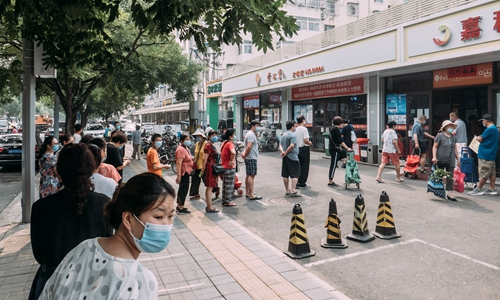Chinese need resilience in virus fight: Global Times editorial
Source:Global Times Published: 2020/6/15 22:48:40

Residents in Beijing queue outside a market on June 14. Photo: Li Hao/GT
Beijing is the capital of China, so the new epidemic outbreak will easily send shockwaves across the country. It is of vital importance that the latest outbreak in Beijing does not impede the national resumption of work and production. This is also a test for Chinese society.
We must put the epidemic in Beijing under control and prevent it from spreading to the rest of the country. During this process, we must let science speak and minimize the economic and social cost of this prevention and control work.
Beijing is not Wuhan 2.0. Beijing has accumulated anti-virus experience in the past few months. It also experienced fighting SARS 17 years ago. So it reacted fast this time and carried out preventive measures across key areas. We believe the virus will not spread wildly as in the early stage in Wuhan. As prevention and control mechanisms in the country are functioning, there is zero possibility that the epidemic in Beijing will spread to other parts of the country in large scale.
Be it Beijing residents or those from the rest of the country, they must remain calm as they cooperate in this latest anti-virus fight. Such calmness matters a lot to the country's economic recovery. We must accept the reality that the epidemic will repeatedly occur in China, and what we should do is fight the virus in a scientific way while letting other important agenda not get affected by it.
Chinese society is much more sensitive toward the epidemic than Western societies. This has injected positive momentum. But we must be aware that when things are overdone, they will have a negative effect. When the anti-virus fight becomes a protracted battle, it must go hand in hand with other social agenda. We should try to balance the development of each agenda.
European societies don't care much about the pandemic, but we can't copy the way they deal with the pandemic. Indeed, European countries have their own problems in battling the virus, but they have given us a reference on how to do our job in the fight against COVID-19. We are actually in a world where different models of battling the virus compete with each other.
The pandemic could last months, even years. We may have to make a change: turning comprehensive prevention, which aims to clear any outbreak within a short time, to precise prevention and simultaneously bearing some uncertainties. Our general goal should be to keep infections close to zero rather than pursuing absolute zero infection.
The ability to spot new infections and track the infection chain needs to be constantly developed in China. This ability should be the reason that people feel safe. A sense of security does not come from the city having zero infections and those coming to the city not carrying the virus. Chinese society must form such a consensus as China continues to open up to the world.
Such being the case, the Chinese people need to stay calm, while officials shouldn't be concerned about being held accountable if new infections appear. China should be more mature after each stage of the battle against the epidemic. Beijing has acted quickly and properly in handling the latest outbreak. We hope this case could be a lesson for China in facing the normalcy of the virus fight and precise prevention.
China must put the epidemic under control and the resumption of work and production must not be significantly affected by the new infections in Beijing. The ability to clear all COVID-19 cases must become China's advantage in reviving its economy. The Chinese people are capable of being less infected and, at the same time, the most rapid in returning to normal life.
Posted in: EDITORIAL